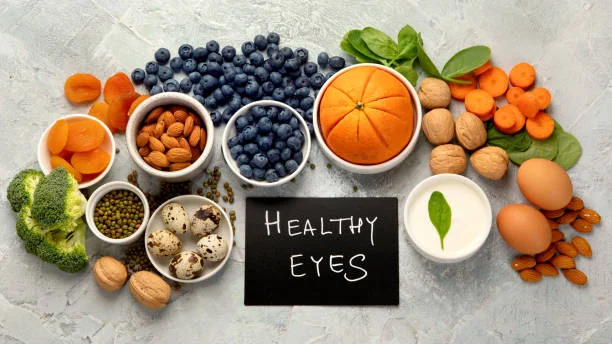Beyond what meets the eye, there is a deep connection between our dietary choices and our eye health. While considering our total well-being, it is critical to understand how our habits and general health affect our vision. For example, lack of nutrition affects the clarity and quality of your vision. In this post, we will look at the issues that can develop when we fail to fuel our bodies and eyes appropriately.

Nutrition and Eye Health
Nutrition is crucial for maintaining overall health, including eye health. Proper functioning of the eyes requires a variety of vitamins and minerals, and a lack of these nutrients can lead to vision problems. Some of the essential nutrients for eye health include:
Vitamin A is necessary for night vision and helps prevent dry eye syndrome and age-related macular degeneration.
Vitamin C is an antioxidant that protects the eyes from free radical damage and may help prevent cataracts.
Vitamin E, antioxidant protects the eyes from oxidative stress and may help prevent cataracts
Omega-3 fatty acids are essential for maintaining retinal health and lowering the risk of age-related macular degeneration.
Lutein and zeaxanthin are key nutrients for maintaining retinal function and lowering the risk of age-related macular degeneration.
Zinc is essential for maintaining retinal health and lowering the risk of age-related macular degeneration.
Having the above nutrients in your diet is essential for healthy eye health. Leafy greens, nuts, fish, and fruits are good sources of these nutrients.

Impact of Diet On Healthy Cells and Tissue
A bad diet can harm the health of your eyes' cells and tissues. When you habitually consume a diet deficient in important nutrients, these critical components of your visual system may deteriorate. Here's what could happen:
Cell Damage and Oxidative Stress
Inadequate antioxidant consumption, such as vitamins C and E, exposes your eye cells to damage caused by dangerous chemicals known as free radicals. This can lead to oxidative stress, and cellular dysfunction, resulting in various eye issues.
Weakened structural integrity
Essential vitamins and minerals are required to preserve the structural integrity of ocular tissues. Without an adequate supply of paramount nutrients, tissues might deteriorate, increasing the risk of eye diseases like corneal degeneration and weakened blood vessels.
Reduced Eye Defense Mechanisms
Certain nutrients, such as lutein and zeaxanthin, help to protect the eyes against environmental stresses, damaging UV radiation, and oxidative damage. Without them, your eyes' natural defense mechanisms may diminish, leaving them more vulnerable to harm
Impaired vision and function
Your eyes use a sophisticated network of cells, including photoreceptor cells in the retina, to capture and analyze visual information. Without sufficient nutrition, these cells may not operate properly, potentially resulting in diminished visual acuity, impaired night vision, or even vision loss in serious instances.
Increased risk of eye conditions
A poor diet has also been linked to several eye problems, including age-related macular degeneration (AMD), cataracts, dry eye syndrome, and diabetic retinopathy.
Side Effects of Aspartame
It is critical to be aware of the dangerous substances that may be present in unhealthy foods. One such component is aspartame. Aspartame is an artificial sweetener that has been linked to a variety of adverse effects that can harm your eyes. This ingredient is available in soft drinks, sugar-free desserts, and low-calorie snacks. It may bring numerous dangers, including:
- Blindness
- Vision issues include blurring, tunnel vision, flashes, and so on
- Eye discomfort
- Dry eye
- Discomfort with contact lenses
- Bulging eyes
Tips for Making Healthy Choices
Avoid using store-bought salad dressings, mayonnaise, ketchup, barbecue sauces, and other prepared foods because they are rich in sugars, fats, and additives. Instead, season salads and prepare sauces with natural, fresh ingredients like basic vinegar and heart-healthy olive oils.
Furthermore, consuming a fruit and vegetable-rich diet will help to keep your eyes' cells and tissues healthy. Fruits and vegetables rich in vitamins include:
Children should have their first eye exam at around 3 years old, and then again before they start school
Other tips:
- Use proper lighting when reading or doing other close-up work.
- Take breaks from computer screens and other digital devices.
- Use eye drops if your eyes feel dry or irritated.
- Be aware of your family's eye health history and talk to your doctor about any concerns you have.
What is a low-vision specialist?
A low-vision specialist is a healthcare professional trained to assist individuals with vision impairment that cannot be fully corrected with standard glasses, contact lenses, or medical/surgical treatments. Their primary aim is to maximize a person's remaining vision and improve their quality of life despite visual limitations.
Furthermore, consuming a fruit and vegetable-rich diet will help to keep your eyes' cells and tissues healthy. Fruits and vegetables rich in vitamins include:
- Citrus fruits
- Kiwis
- Apricots: fresh or dried
- Tomato and pepper
- Raw carrots
- Green leafy veggies, specifically spinach and kale
- Green Peas with Beans
- Brussels sprouts

Protecting Your Blood Vessels
The eyes are vascular, which means they rely on small blood veins to function. A high-fat diet can be harmful to both your eyes and your heart. Eating omega-3-rich meals, such as salmon, is beneficial to eye health. You should limit your consumption of processed deli meats, high-fat dairy and margarine, and saturated fat-rich cooking oils.
Getting Tips for Healthy Eyes
Consuming a diet rich in vitamins, minerals, and antioxidants important for eye health may be challenging. Some optometrists could even recommend vitamins. If you're concerned about how your diet can affect your vision, visit Elite Eye Care, New York. "Our team of optometrists can evaluate your current eye health and offer you the necessary assistance."
